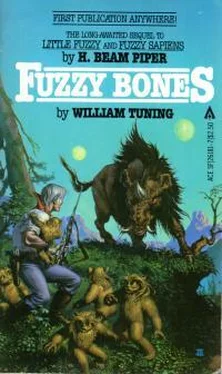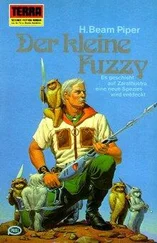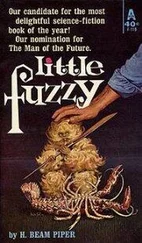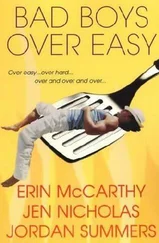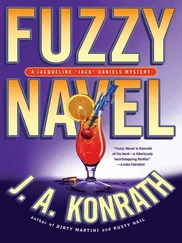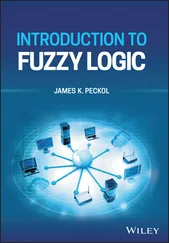thing, Hugo," he said.
Ingermann was a little miffed at the familiarity of using his first name, but he knew he couldn't afford to show it. "My back is killing me," he said.
"Damned cot."
Finally, Laporte looked up at him. "Hugo," he said evenly, "for years now you've had the idea that you were in charge of something around here. The rest of us have gone along with it because it didn't hurt anything-and it was profitable for all concerned. Now, you've brought the law down on all of us.
They're leaning on everyone in Junktown like I've never seen before, and it's your fault-because you did a stupid thing."
"Stupid!" Ingermann snapped. "How dare you call me stupid!"
"I call you what I please, Hugo," Laporte said. "If you had to have the girl shut up, why didn't you use your brains and have it done quietly, without any fuss, and especially not while she was making a screen call in public."
"Why-I've made you all rich," Ingermann said huffily. "I've-"
Laporte cut him off." You've been the best crooked lawyer I ever had," he said. "That's what you've done for us-until you managed to get disbarred. Now, you're not even any good for that."
Ingermann leaped out of his chair, his face white with rage.
Laporte snapped his fingers, and a very large man appeared from an adjoining room. Ingermann sat down.
"What it comes down to," Laporte said, "is that we just can't afford to be associated with you any more. They're out to get you, and they will. There's an eighty thousand sols price on your head, and I wouldn't give you six-to-five one way or the other who will be the first to turn you in for it.
The safest thing for you to do is stay clear of everyone you know."
"Why, this is preposterous!" Ingermann fumed. "I will not be treated this way!"
Laporte's patience was wearing thin. He sprang to his feet, put the flat of both hands on his desk-with the knife near his right hand. "And that'snot the worst of it!" Laporte shouted.
Ingermann shrank back from the verbal attack.
"The worst of it," Laporte said, "is that you had to go and shoot the only decent singer I've been able to hire for this joint in the last five years!"
There was a moment of silence.
Laporte made a gesture of dismissal. "Now get out of here-before I have you thrown out."
After a shaken Hugo Ingermann had left the office, Laporte turned to his assistant. "I don't think Mr. Ingermann is quite in his right mind," he said.
"It might be better for everybody if some kind of accident happened to him."
The large man nodded and left the room by a side door.
It was unusual for Alex Napier to attend to business outside his own office.
He preferred-as a matter of protocol-to have people come to him. He had visited Colonel Tom McGraw in his own quarters as a matter of insuring privacy.
"What's your readiness status, Tom?" he asked. Then, he held up his hand. "Not on record, but in fact."
"Coffee, Alex?" McGraw asked. Napier technically outranked him, so he was practicing some protocol of his own.
"Certainly," Napier said and arranged himself in one of the large chairs in McGraw's cabin.
As soon as they were comfortably situated, McGraw said, "We're fine, Alex.
I've stepped up re-supply to the First Battalion. We have the company you ordered on board the San Pablo, and I can load the rest of the brigade on two hours notice-combat ready."
Napier nodded reflectively. "Good," he said, then repeated it. "Good."
"You expecting things to blow up, again?" McGraw asked.
Napier set down his cup and shifted his weight in the chair, so he could reach his pipe and tobacco. "I couldn't sleep last night," he said, carefully packing tobacco into the bowl,"so I went down to commo and monitored the traffic for a while. I can't put my finger on it, exactly, but I don't like it, Tom. I don't like it."
Hugo Ingermann did not customarily drink, and almost never before cocktail hour, but it was past the middle of the afternoon, now, and he didn 't know what else to do. Besides that, the weather was hot and uncomfortable, he felt as though his brain had cooked inside his skull, and he could not recall the last time he had eaten.
It was dim and comfortable inside the bar. Ingermann rolled the cold highball glass across his forehead after he took his first swallow. He began to feel better, but he still didn't have any idea what to do next.
There was a news broadcast on the. large communications screen at one end of the bar.
Ingermann decided he would listen to the news and have another drink.
When the barman brought him the audio outlet, he affixed the earpiece and plugged the other end into one of the pickup jacks across the front edge of the bar.
"... with more reports of street fights in Junktown. Authorities maintain that these incidents are unrelated, and say they expect the situation to quiet down with the onset of cooler weather-and cooler tempers.
"Efforts to verify rumors of a sunstone strike on Beta are still unsuccessful at this hour. Colonial Governor Bennett Rainsford's office issued a statement earlier today to the effect that the matter was still in the area of pure speculation. We'll have tape on that a little later."
Ingermann did not notice the person who slid silently onto the barstool next to him. An idea was about to form itself in his mind and he was trying to focus his attention on it.
"Meanwhile, the search for Hugo Ingermdnn continues, with police expecting an early arrest. Here with a live interview on that story is News Director Franklin Young. Frank. . ."
"Good afternoon, Mr. Ingermann," the man in the hat whispered. "May I join you?"
Ingermann jumped as though he had been stabbed. He turned to stare incredulously into the colorless eyes of the man next to him. There was terror on Ingermann's face.
Joseph Weisberg made a reassuring gesture toward Ingermann as he signalled the barman.
Ingermann took a gulp from his drink. The barman set down Weisberg's drink in front of him, but Weisberg didn't pick it up right away.
"Who-who are you?" Ingermann finally managed to stammer.
Weisberg smiled humorlessly. "Ah, "he said, "you don't remember me, do you?"
Ingermann nodded dumbly.
"Well, it is a matter of no importance," Weisberg said. "What I felt you should know this afternoon," he leaned closer and lowered his voice still more,"is that Raul Laporte has taken a great interest in the state of your health."
Ingermann turned pale. He knew what that meant. Ghu knew he had hired Laporte's services in such matters himself, many, many times in the past.
Weisberg leaned forward and took a sip from his drink.
"Why-why are you telling me this?" he asked. It made no sense. Everyone in town, it seemed, was out to get him, yet here was this stranger giving him information that might well save his life.
Weisberg shrugged. "It is not an incident of great concern to me-one way or the other-but I felt you would consider it useful."
Ingermann's eyes narrowed. "What do you want in return?" he asked.
Weisberg shrugged again. "Nothing," he said. Ingermann still did not comprehend. There had to be a way out of this. Money, of course, could buy anything, but he had no way to get at his own-except for a few small sums he had put away in the event of just such a blowup.
Suddenly, the rest of the puzzle dropped in to place in his tormented mind.
His face brightened. "Blowup," he said softly.
"I beg your pardon?" Weisberg asked.
Ingermann didn't hear him. "Blowup. Heat wave. Riot. Sunstones. Of course," he said. Without another word, he slid off the barstool and scampered out the front door of the lounge.
The barman came hurrying over. "Hey," he said. "That guy didn't pay for his
drinks."
Читать дальше
